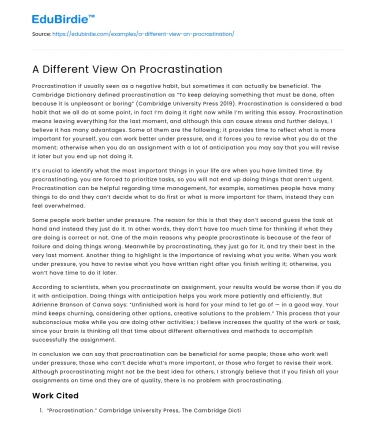Procrastination if usually seen as a negative habit, but sometimes it can actually be beneficial. The Cambridge Dictionary defined procrastination as “To keep delaying something that must be done, often because it is unpleasant or boring” (Cambridge University Press 2019). Procrastination is considered a bad habit that we all do at some point, in fact I’m doing it right now while I’m writing this essay. Procrastination means leaving everything for the last moment, and although this can cause stress and further delays, I believe it has many advantages. Some of them are the following; it provides time to reflect what is more important for yourself, you can work better under pressure, and it forces you to revise what you do at the moment; otherwise when you do an assignment with a lot of anticipation you may say that you will revise it later but you end up not doing it.
It’s crucial to identify what the most important things in your life are when you have limited time. By procrastinating, you are forced to prioritize tasks, so you will not end up doing things that aren’t urgent. Procrastination can be helpful regarding time management, for example, sometimes people have many things to do and they can’t decide what to do first or what is more important for them, instead they can feel overwhelmed.
Save your time!
We can take care of your essay
- Proper editing and formatting
- Free revision, title page, and bibliography
- Flexible prices and money-back guarantee
Some people work better under pressure. The reason for this is that they don’t second guess the task at hand and instead they just do it. In other words, they don’t have too much time for thinking if what they are doing is correct or not. One of the main reasons why people procrastinate is because of the fear of failure and doing things wrong. Meanwhile by procrastinating, they just go for it, and try their best in the very last moment. Another thing to highlight is the importance of revising what you write. When you work under pressure, you have to revise what you have written right after you finish writing it; otherwise, you won’t have time to do it later.
According to scientists, when you procrastinate an assignment, your results would be worse than if you do it with anticipation. Doing things with anticipation helps you work more patiently and efficiently. But Adrienne Branson of Canva says: “Unfinished work is hard for your mind to let go of — in a good way. Your mind keeps churning, considering other options, creative solutions to the problem.” This process that your subconscious make while you are doing other activities; I believe increases the quality of the work or task, since your brain is thinking all that time about different alternatives and methods to accomplish successfully the assignment.
In conclusion we can say that procrastination can be beneficial for some people; those who work well under pressure, those who can’t decide what’s more important, or those who forget to revise their work. Although procrastinating might not be the best idea for others, I strongly believe that if you finish all your assignments on time and they are of quality, there is no problem with procrastinating.
Work Cited
- “Procrastination.” Cambridge University Press, The Cambridge Dictionary. https://dictionary.cambridge.org/dictionary/english/procrastinate. Accessed 22 January 2019.






 Stuck on your essay?
Stuck on your essay?

